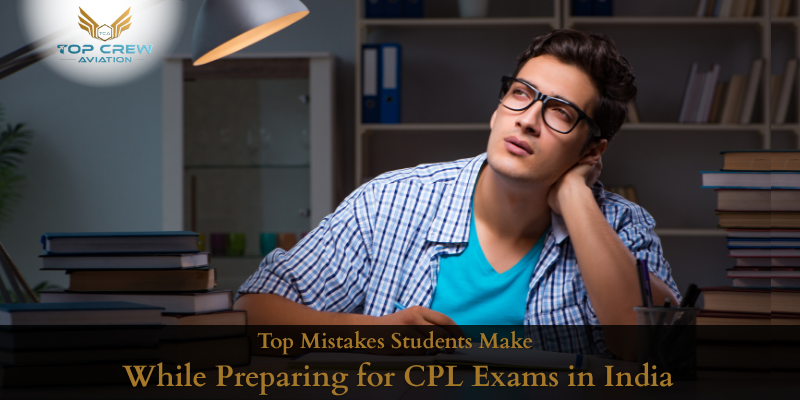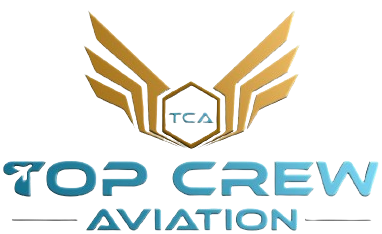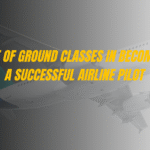
Becoming a commercial pilot is not just a dream—it’s a serious commitment. Thousands of students across India begin their journey toward earning a Commercial Pilot License (CPL) each year. But before they can fly aircraft professionally, they must first clear the DGCA (Directorate General of Civil Aviation) theory exams. These exams are the foundation of aviation knowledge and a legal requirement for anyone who wants to become a commercial pilot.
Unfortunately, many students make avoidable mistakes during their preparation. These errors often lead to poor performance, exam failure, or delays in their overall training timeline.
In this detailed blog, we will explain the top mistakes CPL aspirants make while preparing, how these mistakes affect their journey, and what you can do to avoid them.
What Are DGCA CPL Exams?
The DGCA conducts several written exams as part of the CPL (Commercial Pilot License) requirements. These exams test a student’s knowledge in aviation theory before they are allowed to begin or continue with their flight training.
DGCA CPL Subjects Include:
| Subject Name | Description |
| Air Navigation | Covers flight planning, instruments, maps, and charts |
| Aviation Meteorology | Teaches weather patterns, clouds, winds, and forecasts |
| Air Regulations | Includes aviation law, DGCA rules, and international protocols |
| Technical General | Explains aircraft systems and basic aerodynamics |
| Technical Specific | Explains aircraft systems and basic aerodynamics |
| Radio Telephony (RTR) | Communication procedures with ATC (WPC conducts this exam) |
These subjects require regular study, conceptual understanding, and exam strategies. That’s where many students go wrong.
Mistakes CPL Students Commonly Make
Below are the most common and critical mistakes students make while preparing for CPL exams—and how you can avoid them.
Not Taking Ground School Seriously
Many students join a flying school with excitement about flying, but neglect ground school. They believe that flying is the main part of becoming a pilot, and the theory exams are secondary. This is a huge mistake.
- The CPL cannot be issued until all DGCA theory papers are cleared.
- Weak theory knowledge can result in poor decision-making while flying.
- Good pilots are excellent in both flying and theory.
Avoid it: Treat your ground school like any degree-level course. Dedicate specific hours daily and attend all classes regularly.
Studying Without a Plan or Structure
Some students open books at random and study based on what they feel like. This unplanned approach leads to:
- Missed topics
- Poor retention
- Confusion during revision
Avoid it:
Create a detailed study timetable. Break your syllabus down by subject, topic, and number of days available. Use calendars, apps, or notebooks to track your progress.
Not Solving Previous Year Question Papers
DGCA exam patterns often repeat certain question types. Many students fail to take advantage of this and enter the exam hall without having practiced real exam-level questions.
Avoid it:
- Solve past 5–10 years of papers
- Mark difficult or repeated questions
- Time yourself to simulate real exam conditions.
This improves your speed, accuracy, and confidence.
Ignoring Difficult Topics
Subjects like Celestial Navigation, Weather Forecast Interpretation, or Aircraft Instruments can feel overwhelming. Many students avoid them and focus only on what they already know.
Avoid it:
Instead of skipping topics, try to:
- Watch YouTube tutorials
- Take help from instructors or batchmates
- Practice until the concept becomes familiar
Mastering difficult areas gives you an edge.
Depending Too Much on Coaching Notes
Many students rely only on classroom notes or printed materials from coaching centers. But these are often summaries and not complete resources.
Avoid it:
Use multiple learning sources:
- DGCA books (like Oxford or Aviation Theory Centre)
- ICAO documents
- Online video explanations
- Real-time discussion forums
Understanding comes from reading, re-reading, and applying.
Poor Time Management During Exams
Even after studying well, many students panic during the exam. They waste too much time on one question or leave easy ones unfinished.
Avoid it:
- Divide your exam time smartly
- Attempt known questions first.
- Mark tough ones for later.
- Practice mock exams in exact time limits.
This reduces stress and improves performance.
Neglecting Health and Daily Routine
A tired mind cannot absorb information. Many students study for long hours, skip meals, and sleep late, thinking they are “working hard.”
But in reality, they are reducing brain function, energy, and focus.
Avoid it:
- Sleep at least 7–8 hours daily
- Eat nutritious food and hydrate.
- Include small breaks during long study hours.
- Go for light exercise or walk daily to relax the mind.
Healthy habits lead to better memory and clarity.
No Revision Strategy
Students often feel confident after one round of study. But memory fades. Without revision, even well-studied topics can be forgotten during the exam.
Avoid it:
- Keep the last 2–3 weeks before the exam only for revision
- Make short notes or flashcards for quick revision.
- Revise difficult formulas and facts repeatedly.
Use active recall methods—like quizzing yourself—to make revisions effective.
Not Keeping Track of DGCA Updates
DGCA frequently releases updates, circulars, and syllabus modifications. Students who don’t check the official website may prepare outdated material.
Avoid it:
Visit the DGCA Official Website weekly and subscribe to aviation news portals to stay informed.
Starting Late or Studying at the Last Moment
Many students think they’ll start studying once they get their medicals or complete some flying hours. This delay can lead to unnecessary pressure and exam failure.
Avoid it:
Start preparation as early as possible—even while waiting for your medicals or flying slot. Earlier preparation means more time for revision and confidence-building.
How to Study Smart for DGCA CPL Exams
Here are some strategies you can follow to improve your preparation:
| Strategy | Benefit |
| Prepare short topic-wise notes | Helps quick revision |
| Use question banks and mock tests | Boosts exam confidence |
| Learn from multiple resources | Ensures deeper understanding |
| Maintain a concept clarity log | Tracks difficult topics |
| Join pilot forums or groups | Encourages discussion and sharing |
Final Advice from Experts
Remember, flying an aircraft is a huge responsibility. A strong theoretical foundation is the key to becoming a safe and confident pilot. Every successful pilot was once a student who made the right choices during their ground school days.
By avoiding these common mistakes, you can increase your chances of passing CPL exams on the first attempt and move closer to your dream of flying professionally.
Conclusion
Preparing for DGCA CPL exams is more than just passing theory papers—it’s about building a strong foundation to become a skilled and responsible pilot. Many students fail due to avoidable mistakes like poor planning, skipping tough topics, or underestimating ground school. By staying disciplined, managing your time well, and focusing on both theory and practical knowledge, you can clear your exams with confidence. Success in aviation starts with smart preparation. Avoid these common pitfalls, and you’ll be one step closer to earning your Commercial Pilot License and starting your flying career with pride and confidence.
Suggestion URL:
Frequently Asked Questions
No FAQs found.



